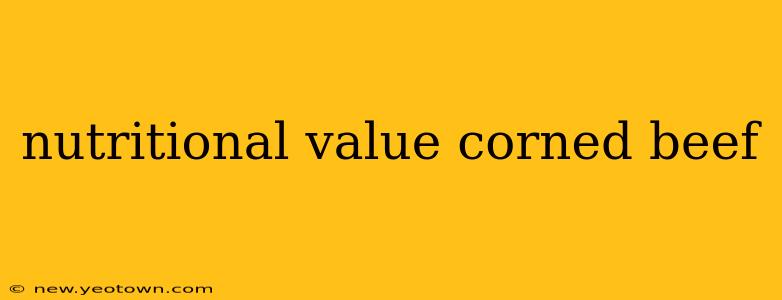Corned beef. The very name conjures images of St. Patrick's Day celebrations, hearty sandwiches, and perhaps a lingering question: just how nutritious is this beloved, brined beef? Let's embark on a flavorful journey to explore the nutritional value of corned beef, separating fact from fiction and understanding its place in a balanced diet.
Our story begins, as many culinary tales do, with the humble cow. Before becoming the vibrant pink centerpiece of countless meals, corned beef starts as a cut of beef brisket, a tougher cut that benefits significantly from the long, slow brining process. This process, involving salt, sugar, and often spices like nitrates or nitrites for preservation and color, transforms the brisket, tenderizing it and imparting its characteristic salty flavor.
What's Inside That Slice? A Nutritional Breakdown
A typical 3-ounce serving of corned beef offers a significant dose of protein, crucial for building and repairing tissues. It also provides several essential B vitamins, vital for energy metabolism and nerve function. However, the story doesn't end there. Corned beef's nutritional profile is a double-edged sword. While it delivers protein and B vitamins, it's also relatively high in sodium and saturated fat. Let's delve deeper into these aspects:
High in Sodium: How Much is Too Much?
This is arguably the most significant concern surrounding corned beef consumption. The brining process, essential for its flavor and preservation, results in a very high sodium content. Excessive sodium intake is linked to increased blood pressure and a higher risk of cardiovascular diseases. Therefore, moderation is key.
Saturated Fat Content: A Heart-Healthy Perspective
Corned beef also contains a considerable amount of saturated fat. While some dietary fat is necessary, excessive saturated fat intake can contribute to high cholesterol levels, increasing the risk of heart disease. Balancing corned beef consumption with other heart-healthy foods is crucial.
Lean vs. Fatty Cuts: Making Informed Choices
While all corned beef contains a certain amount of fat, the fat content can vary depending on the cut of beef used and the preparation method. Choosing leaner cuts and trimming visible fat before cooking can help reduce the overall saturated fat intake.
Frequently Asked Questions (Addressing Your Corned Beef Queries)
Let's address some common questions people have about the nutritional aspects of corned beef:
Is corned beef healthy?
Corned beef can be part of a healthy diet, but it should be consumed in moderation due to its high sodium and saturated fat content. It's a good source of protein and B vitamins, but its overall nutritional profile necessitates mindful consumption.
How many calories are in corned beef?
The calorie count in corned beef varies depending on the cut and preparation method, but a 3-ounce serving generally contains around 150-200 calories.
Is corned beef good for weight loss?
Due to its relatively high calorie and fat content, corned beef isn't ideal for weight loss. Choosing leaner cuts and controlling portion sizes can help mitigate this aspect, but it's not a weight-loss-friendly staple.
What are the benefits of eating corned beef?
The primary benefit of corned beef is its protein content, essential for building and repairing tissues. It also provides several B vitamins important for energy metabolism.
Are there any downsides to eating corned beef?
The main downsides are the high sodium and saturated fat content, both linked to increased risks of cardiovascular diseases.
Conclusion: Savoring Corned Beef Mindfully
Corned beef, with its rich history and satisfying flavor, undoubtedly holds a special place on many tables. However, understanding its nutritional profile allows for informed consumption. By being mindful of portion sizes, choosing leaner cuts, and incorporating it as part of a balanced diet rich in fruits, vegetables, and whole grains, you can enjoy the deliciousness of corned beef without compromising your health. Ultimately, moderation and balance are the keys to enjoying this flavorful food as part of a healthy lifestyle.

